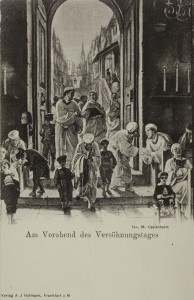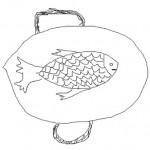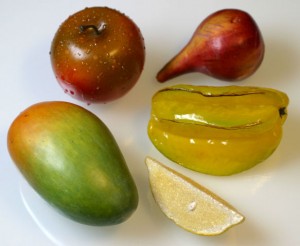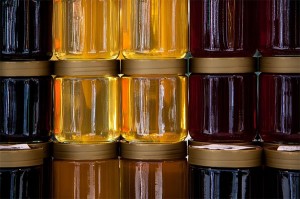Employees of the Jewish Museum Berlin respond:
“I like Rosh ha-Shanah, and new year festivities in general. I celebrate them all: birthdays, the High Holidays, and December 31st.” Naomi Lubrich, Media

The postcard is the only copy of a painting by Moritz Daniel Oppenheim from 1873, which was destroyed in London in 1939. © Jewish Museum Berlin, photo: Jens Ziehe
You will find more postcards from the past in our Online Showcase
“I usually use the time between Rosh ha-Shanah and Yom Kippur to figure out what’s not going so well in my life and what I want to change. I take some time to think about it and take stock.” Sarah Hiron, Education
“The High Holidays, like the Sabbath, are a chance to make time for my spiritual faith. For me they are special – holy – days. They encourage me to carry on traditions and become more aware. At the same though, they mean time off, and that means nightlife, having fun, and sleeping in.” Roland Schmidt, Host
“Although I live a secular life the rest of the year and don’t go to synagogue, Yom Kippur has a great spiritual significance for me. I fast, turn off music and disregard other forms of entertainment. Instead the day is defined by humility, contemplation, silence, and reflecting on nature. Since it’s not a joyful celebration with one central ritual, Yom Kippur is different every year, so I connect it with new and ever-changing personal experiences.” Roman Labunski, Education
Employees of the Jewish Museum Berlin respond:
“When I think back, I remember first of all friends and family, followed by food – a whole lot of food.” Roland Schmidt, Host
“I remember the meals at my grandmother’s as so sumptuous and sprawling that I had the feeling I needed to fast not just on Yom Kippur but for the whole rest of the year.” Alina Gromova, Academic Employee in the Fellowship Program, and Guide

© Alina Gromova, Jewish Museum Berlin
“To stay on the culinary topic, I can bring up the days when gefilte fish was still cooked at home. You would order two carp at the fishmonger – who was doing enough business in September to last the entire year, because the customers celebrating Rosh ha-Shanah would stand in line for live fish. You would carry home the floundering content in a metal bucket on the tram, accompanied by the cold glares of ditrustful animal rights activists sitting near you. → continue reading

Apple, mango, fig, star fruit, lemon
We posed this question to employees of the Jewish Museum Berlin. Some answered curtly, such as one colleague who “doesn’t usually do anything (aside from dipping a few pieces of apple in honey…).” Others answered indirectly via an out-of-office message which ended with “Cordial greetings and Shanah Tovah.” Here are some additional responses:
“I’m going to go to my grandmother’s for Rosh ha-Shanah, like every year. With one difference: I’m hoping that she will follow my advice this year and forget to warm up the gefilte fish before serving it, because it tastes better cold.” Alina Gromova, Academic Employee in the Fellowship Program, and Guide

Honey, source: Pixabay, CC0 license
“Like every year, we observe erev Rosh ha-Shanah at a dinner with friends, which we sanctify by reciting various blessings. We dip apples in honey and buy rare fruit which relinquish their mysteries upon consumption. We celebrate the New Year culinarily, with new, unknown foods to discover, resulting in a kind of biology intelligence test. Unfortunately there are never any kreplach to follow because no one knows how to prepare them anymore, and the gefilte fish comes, if at all, out of a jar. Making it would take days, but worse, cooking fish gives off a smell which fills the entire house, and might drive away the neighbors, and not only the disagreeable ones… The remaining array of dishes is unspectacular. Over the next two days, some of the dinner guests attend synagogue – chosen either out of nostalgia for childhood memories, or out of liturgical interest.” Cilly Kugelmann, Program Director → continue reading



